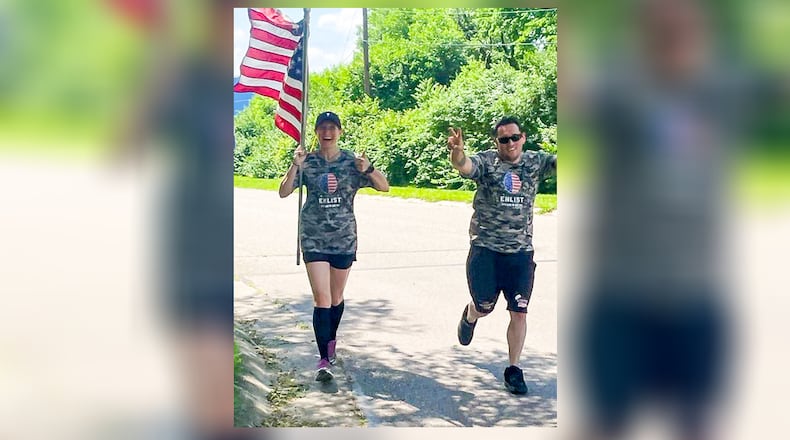After losing her husband, Ron, to suicide four years ago, Condrey has dedicated time and effort to bring awareness to the dangers of brain injuries, many of them undetected.
She said her husband, a Master Explosive Ordnance Disposal (EOD) technician and Master Naval Parachutist, conducted missions around the world during his 14 deployments. He sustained a variety of Traumatic Brain Injuries during combat and training, including a helicopter crash, Humvee rollover and repeated explosive blasts, she said.
So from midnight Sunday to midnight Monday, Condrey, at times accompanied by friends, ran 30 miles in 24 hours hoping to obtain 24 brain pledges.
Because she participated in the parade, and completed other runs, Condrey said she ran six additional miles. She completed a similar run two years ago, she said.
She ran the parade route with Daniel Hutchison, an Army combat medic and close friend of her husband, and John Hart, of Team Fastrax, the Middletown-based professional skydiving team.
“It was a day of camaraderie in honor of our fallen: full of laughter, tears, sweat, pollen, support from near and far, and gratitude for living freely,” she said when asked about completing the 24-hour, 24-mile challenge.
Her legs were sore when she woke up Tuesday, but the worst part was the allergies caused by the pollen, she said.
“But my heart was full,” she said. “The body can heal itself.”
When Condrey noticed someone wearing a veteran T-shirt or hat during the parade, she ran over to them, gave them the 15-second “elevator” speech about Project Enlist, the catalyst for critical research on traumatic brain injury, chronic traumatic encephalopathy and post traumatic stress disorder.
Then she handed them a Project Enlist poker chip.
She said veterans and athletes are the two largest groups that suffer from brain injuries. She hopes that clinical research can help understand the impact of those injuries and how to prevent them, diagnose them and treat them.
Too many times, she said, those injuries aren’t diagnosed until the person has died. She said people without brain injuries are needed to pledge their brains so baselines can be set.
“We don’t collect them early,” she said with a laugh.
Next year, Condrey said, she wants to “challenge” some influential people to join her for one mile to help spread the word.
About the Author

